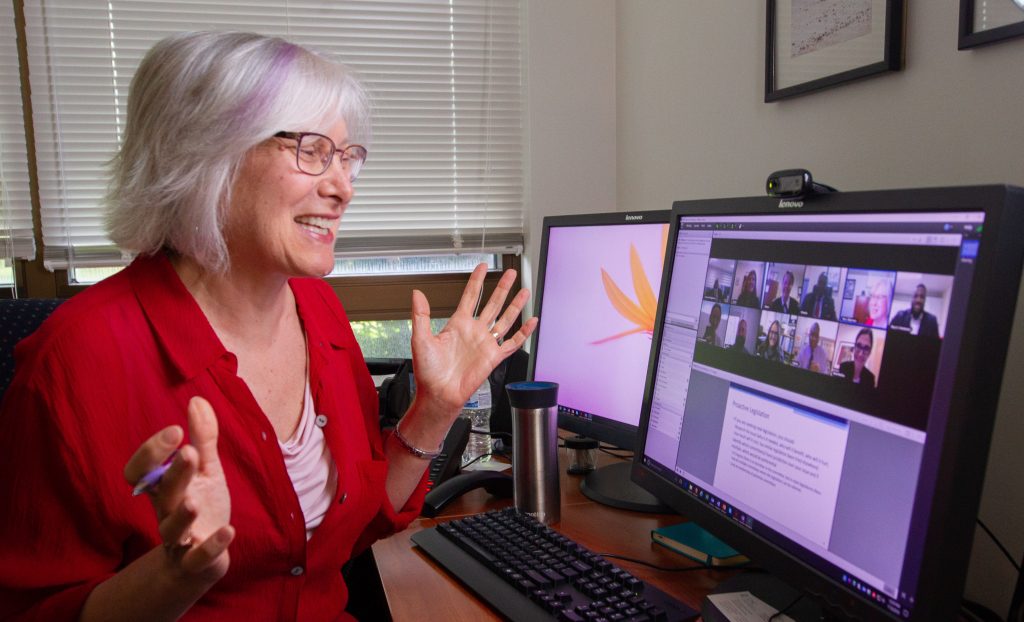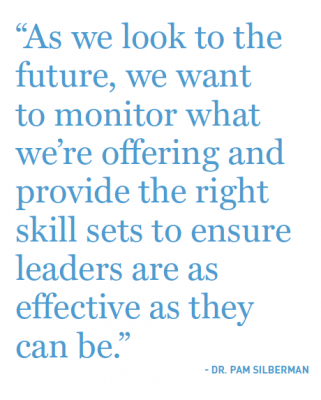The Gillings School's Online DrPH
October 8, 2018
A committed global network of mid-career public health leaders since 2005
 The executive online Doctor of Public Health (DrPH) program in health leadership exemplifies the Gillings School’s commitment to ensuring that public health leaders have the skills and knowledge they need to be effective.
The executive online Doctor of Public Health (DrPH) program in health leadership exemplifies the Gillings School’s commitment to ensuring that public health leaders have the skills and knowledge they need to be effective.
Available to professionals who have at least five years’ experience postmaster’s degree in mid- to senior level leadership positions, the DrPH program aims to enhance the capacity of health leaders to be more effective in improving the public’s health at local, state, national and international levels.
One-third to one-half of each cohort — composed of a diverse group of students with a wide range of backgrounds — live and work outside the United States.
“We use a cohort model in which all students take the same classes throughout the program,” says Pam Silberman, JD, DrPH, professor of health policy and management and director of the DrPH program.

Dr. Pam Silberman chats online with her DrPH students.
Students meet online one night per week, over two years, for classes taught via videoconferencing. The classes are augmented with five of the six onsite sessions on the UNC-Chapel Hill campus. While students are not in the same location for most of the program, they feel a strong sense of community, and that shapes their experiences while in the program.
Because the DrPH program focuses on both local and global systems, one of the six in-person meetings is in a location where students can come to understand the workings of a health care system other than their own – often in London.
“We provide students with a wide array of courses that give them a grounding in the skills they need to be more effective leaders,” says Silberman.
Since the DrPH program is an applied practice degree, the focus of the dissertation is to understand and identify strategies to address a current public health problem and detail those strategies in a “plan for change.”
Silberman says that, while there is a practicum requirement, students can practice from the outset what they are learning – as working full time is a program requirement.
“We consistently hear from students that they apply what they learn in class in their jobs,” she says.
The Gillings School was one of the first public health schools to offer an online DrPH program designed for midcareer leaders at work in the field.
Now, 13 years later, more than 100 people have successfully defended their dissertations.
In 1992, in response to a 1988 landmark report by The Institute of Medicine (now the National Academies of Sciences, Engineering and Medicine’s Health and Medicine Division), which noted the need for public health practitioner leadership training, the School offered a one-year residential program. Recognizing the challenges for working professionals to take leave to attend a residential doctoral program, UNC developed the online two-year executive program in 2005. Since then, it has become one of the most competitive and emulated DrPH programs.
 Silberman and her colleagues continually work to improve it.
Silberman and her colleagues continually work to improve it.
In the last few years, the curriculum has grown to include classes in systems thinking, program planning and implementation science. Plans are underway to add classes on effective education and pedagogy skills.
“As we look to the future, we want to monitor what we’re offering and provide the right skill sets to ensure leaders are as effective as they can be,” says Silberman.
Graduates continue to find benefit.
In a 2015 alumni survey, 96 percent of respondents reported that they would “strongly” or “very strongly” recommend the program. Almost four-fifths (79 percent) reported that the Gillings School’s DrPH program accelerated their careers or promotion paths, and 76 percent reported taking on more leadership roles as a result of their training.
Silberman says that graduates form an enduring learning community that strengthens the field of public health.
“Within each cohort, students develop lifelong friendships,” she says. “Long after the program is over, those ongoing relationships provide a continuous learning environment in which our graduates provide professional and personal support to one another.”
—Michelle Lynn
Carolina Public Health is a publication of the University of North Carolina at Chapel Hill Gillings School of Global Public Health. To view previous issues, please visit sph.unc.edu/cph.
